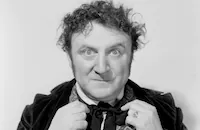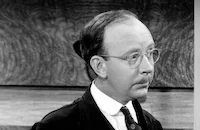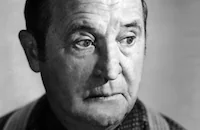The Captain of Koepenick
Brief Synopsis
Cast & Crew
Richard Oswald
Albert Basserman
Mary Brian
Eric Blore
Herman Bing
George Chandler
Film Details
Technical Specs

Synopsis
In the late nineteenth century, as German shoemaker Wilhelm Voight is released from prison after serving fifteen years for various minor infractions, he learns that he can no longer have his passport. That night, Wilhelm runs into his old friend, Kelle Kallenberg, a petty thief who tells him that if he has not been in the army, he cannot be respectable, and advises him to get a job with a certain shoemaker. The shoemaker cannot help Wilhelm and suggests that he try working in a large factory in which the lack of a passport may not be important, but the factory personnel manager also turns Wilhelm down. The disheartened shoemaker realizes that he cannot get a passport without a job and he cannot get a job without a passport. When a passport office worker turns him away, Wilhelm notices a stack of passports and decides to have Kelle help him to steal one late that night. During the robbery, the police arrive and both men are arrested. In prison once more, Wilhelm is given a military handbook by a guard and told to memorize it to better himself. In 1912, Wilhelm is again released and goes to the apartment of his sister Marie, who, with her husband, Friedrich Hoprecht, welcomes him. Because of his now extensive knowledge of military rules and traditions, Wilhelm surmises immediately that Friedrich is an infantry sergeant, a fact that impresses Friedrich, who suggests that Wilhelm register with the local police to get a work permit. Instead, Wilhelm is notified that he is being expelled from the town. Wilhelm and Friedrich argue over the role of strict discipline in society and when Wilhelm proffers that Germany consists only of soldiers, whether in or out of uniform, Friedrich accuses him of being an anarchist. Wilhelm sadly leaves and goes to a costume shop, where he buys a captain's uniform, telling the shopkeeper that it is for a masquerade. He then takes the train to Berlin and changes into his uniform in the station washroom. Upon leaving the washroom, he encounters two train attendants who are frightened by the authority with which he tells them to discipline themselves. On the street, every soldier and petty official salutes him. When he encounters a group of soldiers, he orders them to go with him to the train station and travel to the nearby town of Koepenick. Although the soldiers have no idea why they are going with Wilhelm, they simply obey his orders, because he appears to be an officer. A short time later, the mayor of Koepenick, Mr. Obermueller, dictates a letter asking his superiors for more soliders. Meanwhile, at the town's garrison, Wilhelm orders the soldiers to man the garrison and asks Kilian, the city hall guard, to be taken to the mayor. Upon meeting the mayor, Wilhelm says that he is under the Kaiser's orders to arrest him and take him to Berlin. Wilhelm orders the staff to issue him a new passport, but soon learns that the town is too small to have its own passport office. After telling the town treasurer, Rosenkrantz, to hand over all of the cash in the treasury, a melancholy Wilhelm goes to a café. He then gives his soldiers money for the train, plus money for beer and tells them to return to the train in thirty minutes. He takes the train out of town as Kilian delivers Obermueller and Rosenkrantz to the Berlin garrison. Even though there are no written orders, the prisoners are accepted because Kilian insists. Arriving back in Berlin, Wilhelm changes back into his civilian clothes and returns to his former, lowly self. Obermueller and Rosenkrantz are released when the police commissioner realizes that a hoax has been played. Soon, wanted posters offering a reward of 10,000 marks for information leading to the arrest of "the Captain of Koepenick" are seen by the amused citizens of Berlin. Knowing that the police will never find him, Wilhelm returns to the passport office and offers a bargain: if he gets a passport, he will deliver the Captain of Koepenick. He then shows the passport official, by producing money from the Koepenick treasury and donning the uniform, that he is indeed the captain. The passport official and the police commissioner are delighted with Wilhelm, who explains that it only took a uniform to accomplish what he did and he did it for the passport, not the money. Wilhelm is given a life sentence for his hoax, but the Kaiser commutes it and instead demands that Wilhelm be given a passport to leave Germany immediately and not further disgrace the country. Finally, Wilhelm happily crosses the border.

Director
Richard Oswald
Cast

Albert Basserman

Mary Brian

Eric Blore

Herman Bing
George Chandler
Luis Alberni
Wallis Clark
Else Basserman
Claud Allister

Bernard Gorcey

Hobart Cavanaugh

Frank Orth

Sig Arno

Russell Hicks
Selden Bennett
Dick Alexander
Vera Lewis
Walter O. Stahl
Brian O'hara
Geraldine Gray
Greta Doe
George Sherwood
George Eldridge
Lionel Belmore
Bob Winton
Jack Chefe
Clem Wilenchick
Douglas Rutherford
Ted Jacques
Max Willenz
Dan Stowell
Crew
John Alton
Daniele Amfitheatrof
Ben Berk
Jack R. Berne
Rudi Feld
Ivan Goff
Ivan Goff
John Hall
Albrecht Joseph
George Moskov
Gerd Oswald
Douglas M. Somlyo
Dorothy Spencer
Frank Sylos
Karl Zint

Film Details
Technical Specs

Quotes
Trivia
Notes
The viewed print bore the title I Was a Criminal, the title under which it was reviewed in 1946. No reviews have been located prior to 1946 and it is possible that the picture had been theatrically released until that year. The opening credits bore the following written prologue: "This story is not a legend, it really happened, Wilhelm Voight really lived." In the opening credits, composer Daniele Amfitheatrof's first name is spelled "Daniel," and screenwriter Albrecht Joseph's first name is spelled "Allbright." There is a small animated sequence in the film in which "Wilhelm" looks at the military handbook and a black and white sketch of marching soldiers comes to life. The style of the animation suggests that it May have been made for the 1931 German picture, Der Hauptman von Koepenick, on which the 1941 film was based. The 1931 film, also directed by Richard Oswald, was written by Carl Zuckmayer and Albrecht Joseph. Zuckmayer, a noted German playwright, wrote a play of the same title (Berlin, 5 March 1931), and Joseph adapted the German screenplay for the American version.
According to a feature article on the film in a January 4, 1942 issue of PM's Weekly, the film was made at a cost of $350,000 and shot in ten days. The cast and crew reportedly worked for nothing, in exchange for a share in the picture's profits. According to a Hollywood Reporter news item on February 5, 1940, Columbia pictures had considered filming a version of the story to star Edward G. Robinson; another news item, on August 27, 1940, noted that M-G-M was planning to film a short version of the story as part of John Nesbitt's "Passing Parade" series, with a screenplay to be written by Doane Hoag. Neither film was produced, but another German version was made in 1955. In one scene of the 1941 picture, set in a train station, an actor resembling a young Adolf Hitler is seen painting a sign, a reference to the fact that the future Nazi leader had been a sign painter prior to World War I. A German television version of the story was broadcast on the Premiere network in 1997.












